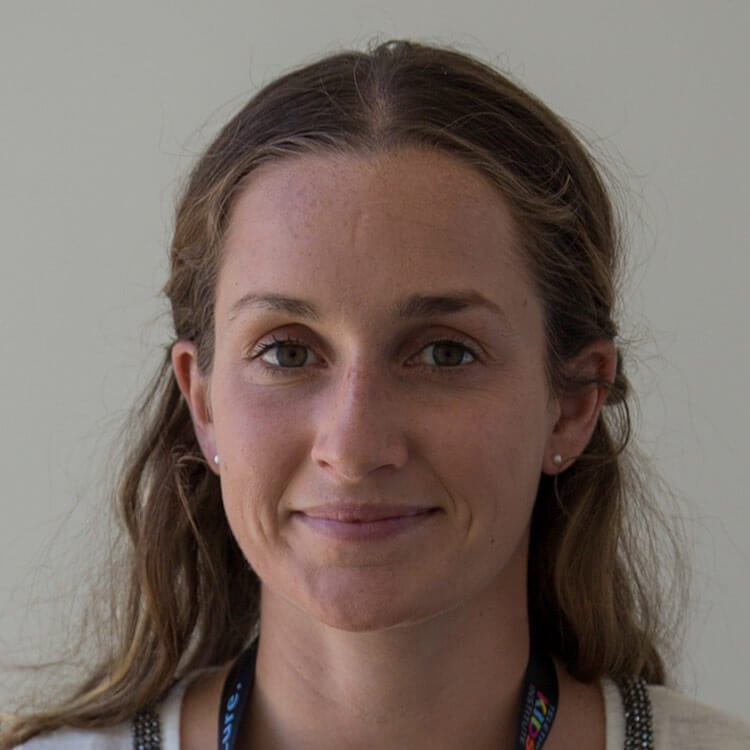
Phoebe George
Research Assistant, PhD Candidate
BSc(Neuro), MPH
phoebe.george@thekids.org.au
Phoebe George is a research assistant on the Child Physical Activity, Health and Development team and Health Promotion and Education Team.
Her research interests include physical activity, child development and health promotion initiatives for children and their caregivers.
She has previously worked as a research assistant on the CoLab- Economic Working Group and CoLab- Bright Tomorrows Start Today Parent App.
Phoebe holds a Master of Public Health and a Bachelor of Science (Neuroscience) with a second major in Physiology from the University of Western Australia.
Projects
PLAYCE@Home - understanding the impact of COVID-19 on children’s physical activity, health & development
Play Active Program – physical activity policy and training for Early Childhood Education and Care
Play Active is a nationally scalable, low-cost program focused on boosting bursts of energetic play throughout the day.
Published research
Living closer to the beach is associated with better socioemotional development in young boys
Natural outdoor environments such as green and blue spaces have increasingly been seen as key health and wellbeing determinants for adults. However, it is unclear if these effects are seen in young children. We examined the associations between access to natural green and blue space and young children's socioemotional development.
Associations between natural blue and green space and preschool children's movement behaviours
Natural outdoor environments provide important settings for children to engage in physical activity. It is unclear if these relationships also exist in preschool aged children. We examined associations between amount and type of neighbourhood vegetation and blue space, proximity to the beach and preschooler's device-measured movement behaviours.
Physical Activity-Related Practices and Psychosocial Factors of Childcare Educators: A Latent Profile Analysis
Limited research investigates early childhood education and care (ECEC) educators' involvement in promoting physical activity. The aim was to identify distinct profiles based on physical activity-related practices and psychosocial factors in ECEC educators and examine how they relate to the amount of time allocated to children's physical activity. A secondary analysis of educator-reported survey data from the Play Active study was undertaken.
The moderating role of parent perceptions in relationships between objectively measured neighbourhood environment attributes and pre-schooler's physical activity: Findings from the PLAYCE study
We examined the moderating effects of parent perceptions of the neighbourhood environment on associations between objectively measured neighbourhood environment attributes and physical activity among pre-schoolers. The number of neighbourhood parks was positively associated with pre-schooler energetic play when parents had above average perceptions of access to services.
Educators’ Barriers and Facilitators to Physical Activity Policy Implementation in the Childcare Setting: Qualitative Findings From the Play Active Project
We explored childcare educators’ perceived barriers and facilitators to policy implementation in order to inform the development and implementation of an early childhood education and care (ECEC) specific physical activity policy. This study was part of the Play Active (2019-2023) project which aimed to develop, implement and evaluate evidence-based physical activity policy to improve physical activity levels in children attending ECEC.
Evaluating the effectiveness of the Play Active policy intervention and implementation support in early childhood education and care: a pragmatic cluster randomised trial protocol
Daily physical activity is critical during the early years of life for facilitating children's health and development. A large proportion of preschool children do not achieve the recommended 3 h of daily physical activity. Early childhood education and care (ECEC) services are a key setting to intervene to increase physical activity. There is a significant need for ECEC specific physical activity policy, including clearer guidelines on the amount of physical activity children should do during care, and strategies for implementation of these guidelines.
Long-term economic outcomes for interventions in early childhood: protocol for a systematic review
Investment in early childhood produces positive returns: for the child, the family and the community.
Healthy population ageing depends on investment in early childhood learning and development
Interventions in the early years provide a sustainable solution by generating long-term labour productivity and social welfare benefits
Education and Qualifications
- [Bachelor of Science (Neuroscience) with a second major in Physiology] – [University of Western Australia]
- [Master of Public Health] – [University of Western Australia]
